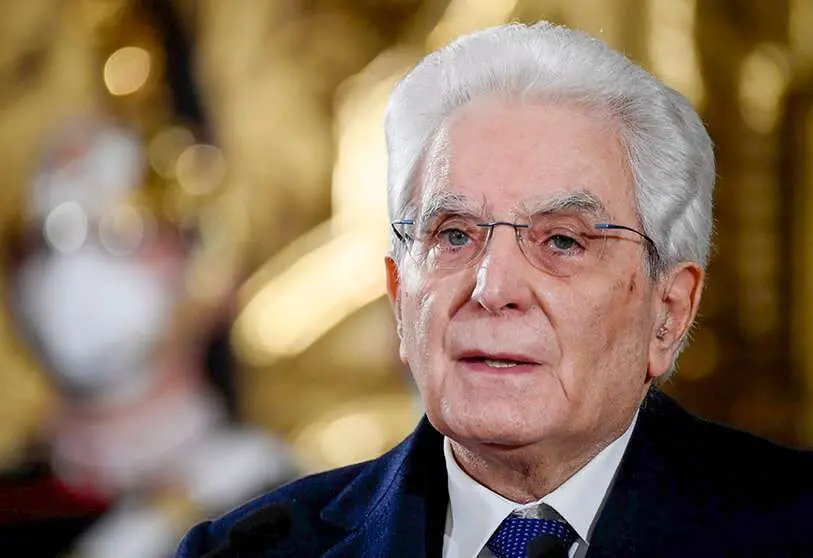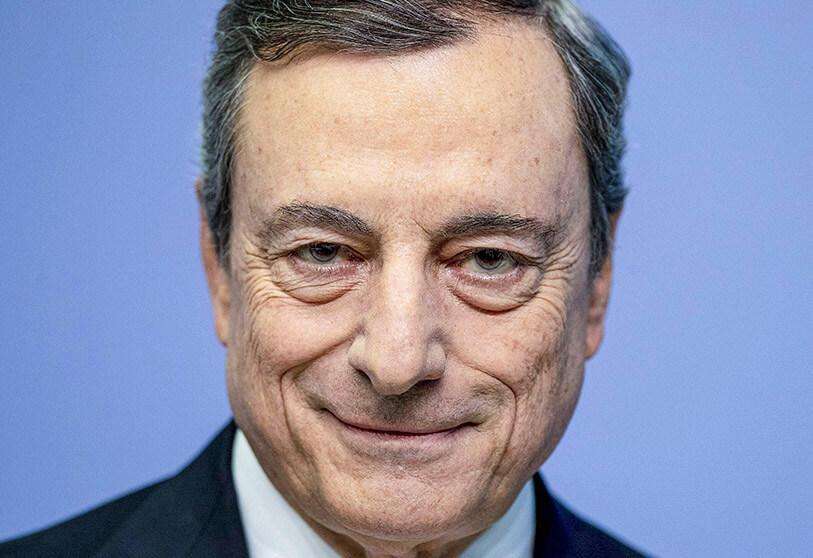The elections to the Presidency of the Republic in Italy, without a "flag-bearer" and open to any possibility

Voting begins in Italy on 24 February to elect the successor to the outgoing President of the Republic, the Sicilian Sergio Mattarella, whose term of office officially ends on 3 February. And, beyond the fact that this type of voting is extraordinarily complicated due to various circumstances (secret ballot, the need for a large majority, etc.), we can already say that it will take place without what is considered a "flag candidate" (i.e. someone agreed in advance by most of the political forces and who is already on the first ballot) and, precisely for this reason, open to multiple possibilities in the normally unpredictable Italian politics.
However, the fact that there is no "flagship candidate" does not mean, by any means, that there are no important candidates. The official candidate is none other than Silvio Berlusconi, four-time Prime Minister, three-time winner of general elections and the person who has been at the head of an Italian government for the longest time (he has spent more than 3,500 days as "premier") since the current Republic of Italy was born on 2 June 1946. And, of course, given Berlusconi's extraordinary ability, all this is upsetting many political forces, particularly those of the centre-left, which since "Il Cavaliere" burst into politics back in 1994, have done nothing but lose elections (picking up, incidentally, the "witness" of the now extinct Italian Communist Party, which could only beat Christian Democracy in the 1984 European elections, losing all the others from 1946 to 1987) except in 1996 and 2006 (plus the "pyrrhic" victory of 2013 and the mirage of 2018 with Five Star), the only two occasions on which the centre-right was defeated at the polls.
Berlusconi's candidacy starts from a basis that is as logical as it is real: the centre-right (whose party, Forza Italia, is one of the three members of the coalition) is in the majority both at parliamentary and social level (all polls show him as the winner since September 2018), and, in addition, Berlusconi's two coalition partners (Salvini for the League and Meloni for Brothers of Italy), cannot be candidates, since the current Constitution establishes that the President of the Republic must be 50 years old at the time of being elected, and Salvini is still at 48 and Meloni at 44, so the way is paved for a Berlusconi who last September turned 85 years old.
The president of the Republic, on the other hand, is elected by the so-called "Colle", which is made up of up to 1,007 voters: 630 deputies, 320 senators and almost sixty delegates sent by the 20 regions that make up the country (except for Valle d'Aosta, which can only send one). So the qualified majority (two-thirds of the Assembly), which is what must be achieved in the first, second or third ballot, is set at 672 votes, while the simple majority, which is how the vote is carried out after the fourth ballot, is reduced to 504 votes.
On the 4th Roberto Fico, as president of the Lower House, established Monday 24th January as the first day for voting. As is logical and to be expected, there were fears that this date would have to be delayed due to the very high number of coronavirus infections in the country in recent weeks (between 100,000 and 180,000 positives per day), but the reality is that, in the week prior to the start of voting, only 29 deputies and 8 senators are in quarantine, which means that there is more than enough quorum to elect the new tenant of the Quirinal Palace. However, between now and the vote, those positive for the coronavirus will not be able to exercise their right to vote from home, as the vote will be secret and must be cast in one of the ballot boxes available to voters in Parliament.
Berlusconi knows that, with the votes of the entire centre-right, his candidacy cannot get through with either an absolute majority or a simple majority, which is why he has started campaigning and his collaborators are calling parliamentarians from other parties. This is pure posturing, because the really decisive forces, such as the Democratic Party (PD) or the Five Star Movement, would never vote for him in principle because they have been openly at loggerheads for years. And the first to know all this is the former Lombard prime minister, which begs the question of the tactical approach behind the announcement of his candidacy. Knowing his ability to achieve what others are unable to do, one wonders whether what he is really doing is paving the way for someone from his party to finally be voted in. And the truth is that he has good candidates, of whom we will give an account below.
One of them is, of course, his "right-hand man" for years: Antonio Tajani (68), former President of the European Parliament and MEP since June 1994. Tajani is openly pro-European (thus continuing the line set by Napolitano and Mattarella), has not made any enemies in transalpine politics and is a person of character, but also conciliatory. His main disadvantages are that he has never been a member of a national parliament or a member of a government, a circumstance that has never been the case for any of the twelve previous heads of state.

This is precisely where the figure of Maria Elisabetta Alberti Caselatti, the current President of the Senate, comes into its own. Undersecretary of Justice in several governments and former member of the Superior Council of the Magistracy, she is at the perfect age (she turned 75 last August, two years older than Mattarella was when he was elected in 2015), she is a highly respected figure and her personal career is unblemished. Her weak point? Quite simply that she is a woman, in a country that, in 75 years of republican history, has had twelve presidents of the Republic, all men, and as many as 31 presidents of the Council of Ministers, also all men. And where only on one occasion has there been a government considered "parity": that of Matteo Renzi, between February 2014 and December 2016.
Of course, their female status may work in their favour, who knows. It should not be forgotten that the female MPs of the Democratic Party (PD) are very angry with their party leadership because, when the last government was formed (February 2021), and they were offered three portfolios, the party leadership decided to give them all to men. So this election, under cover of the secret ballot, could be the perfect opportunity for a 'vendetta' by PD deputies and senators against their party, bringing a woman (the aforementioned Casellatti), who has traditionally had good relations with the entire parliamentary arc, to the presidency of the Republic. In addition, Matteo Renzi's Italia Viva, with almost half a hundred votes, and a few other parties, would be added to the list.
On the other hand, Casellatti, like others (for example, Pera, who presided over the lower house until 2006), has a very important trump card to play: she is president of one of the two parliamentary chambers, and tradition tells us that more than half of the presidents of the Republic have previously presided over a parliamentary chamber. And, moreover, in her case, with respect to this legislature, the lower house (Fico) is no match for her, as she belongs to a party (the Five Star Movement) whose days are increasingly numbered.
Of course, more than a few will ask: does Draghi, the current Prime Minister and the country's most prestigious figure, have nothing to do in this presidential election? The answer is that he may and he may not. We will explain why. Just a year ago he was a "flag bearer": retired to his home in the Marche after eight glittering years as President of the European Central Bank (ECB), he would have been unrivalled in the first ballot. He would not have been voted for by the Five Star Movement, which, in order to "make a name for itself", is capable of voting for anyone but those who do not fit in with the logic of every parliamentarian. But the moment (3 February) he accepted President Mattarella's "incarico" to form a government, he lost almost all his chances of being elected as the new President of the Republic. Because removing Draghi from the Prime Minister's office to send him to the Quirinal is almost like calling early elections, something feared by all political forces with the exception of Meloni and Salvini, who between them do not have the votes to elect Draghi as the new head of state. And that is precisely Draghi's problem: they want him at the head of the executive until March 2023, when the current legislature ends.
Let's see what new surprises transalpine politics has in store for us. The same politics that in 1978 voted an old man (84 years old) called Sandro Pertini as president when he had already packed his bags to go on holiday; the same politics that offered an independent (Ciampi) the Presidency of the Republic when all previous heads of state had been politically active; or the same politics that voted for a Sergio Mattarella who lived happily retired from public life and devoted himself to giving lectures to young people in his native Palermo, and whom the also very skilful Matteo Renzi pulled out of his sleeve when no one expected him to. So, with less than a week to go, we can see that everything is more open than ever. But one thing is clear: the centre-right has a clear advantage, and its ability to move between other formations will determine whether the new president of the Republic for the 2022-29 seven-year term will come from this part of the parliamentary spectrum. In a few days' time, the answer to so many questions.
Pablo Martín de Santa Olalla Saludes is a professor at the Centro Universitario ESERP and author of the book 'Historia de la Italia republicana, 1946-2021' (Madrid, Sílex Ediciones, 2021).



